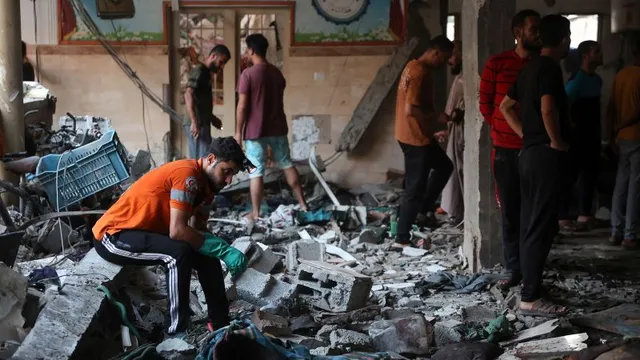
Hamas Leader Calls for Ceasefire
2024-08-11 00:00- Hamas leader Yahya Sinwar seeks ceasefire amid Israeli assassinations.
- Netanyahu's response remains unclear, sparking speculation on the future of the talks.
- The situation is tense as diplomatic efforts continue to navigate the complexities of the conflict.
Express your sentiment!
Insights
TEL AVIV — Yahya Sinwar, previously a shadowy figure within Hamas, has been appointed as the group's political leader following the assassination of Ismail Haniyeh and the confirmed killing of military chief Mohammed Deif. Sinwar's rise to leadership raises questions about the future of cease-fire negotiations and hostage release talks, as he has been largely hidden in the extensive tunnel network beneath Gaza. His unanimous election by the Shura Council signals a united front within Hamas, despite the ongoing violence and Israeli military actions. Sinwar's leadership comes at a critical time, with 115 hostages still held in Gaza after the October 7 attacks that resulted in approximately 1,200 Israeli deaths. Experts suggest that his elevation complicates negotiations for a ceasefire, as communication with him is challenging due to his underground location. Observers note that this move by Hamas indicates a commitment to continued resistance rather than compromise, potentially jeopardizing the prospects for a peaceful resolution. As mediators from Egypt and Qatar convey Sinwar's desire for a ceasefire, Israeli Prime Minister Netanyahu faces pressure from the U.S. to agree to a deal. However, Hamas has expressed skepticism about participating in upcoming negotiations, citing recent Israeli attacks that have escalated tensions. The Hostage and Missing Families Forum in Israel emphasizes the urgency of finalizing a deal to secure the release of hostages, while Netanyahu's coalition partners remain opposed to any agreements with Hamas. The situation remains fluid, with indications that Iran may reconsider its response to Israel based on the outcome of ceasefire discussions. As negotiations continue, the potential for a broader regional conflict looms, underscoring the urgency of reaching a resolution.
Contexts
In the wake of the ongoing conflict between Israel and Hamas, tensions have escalated following the assassination of Hamas leader Ismail Haniyeh. The Israel Defense Forces (IDF) have maintained their focus on protecting civilian lives amidst looming threats from Iranian forces. As the region faces increased uncertainty, Hamas has issued warnings of potential bombings, further intensifying the situation. Amidst cease-fire talks and hostage negotiations, the appointment of Yahya Sinwar as Hamas leader adds to the complexity of the peace process (August 9, 2024). The conflict took a tragic turn as Israeli airstrikes targeted civilian structures in Gaza, resulting in significant casualties. The Israeli military defended these actions as necessary operations against Hamas, while Palestinian health officials reported the devastating toll on innocent lives. The attacks underscore the severe humanitarian crisis in the region as violence continues to plague civilians (August 10, 2024). In a significant escalation, the Israeli military instructed civilians to evacuate a designated humanitarian zone in Gaza, citing the presence of 'embedded terrorist infrastructure' linked to Hamas. This maneuver raises urgent questions about the safety of civilians caught in the conflict, highlighting the dire consequences of military actions on innocent lives (August 11, 2024). Vice President Kamala Harris criticized the loss of civilian lives resulting from an Israeli airstrike on a school allegedly used by Hamas. Emphasizing the need to address the humanitarian crisis and protect innocent lives, Harris's statement reflects growing international concern over the escalating violence in Gaza (August 11, 2024).